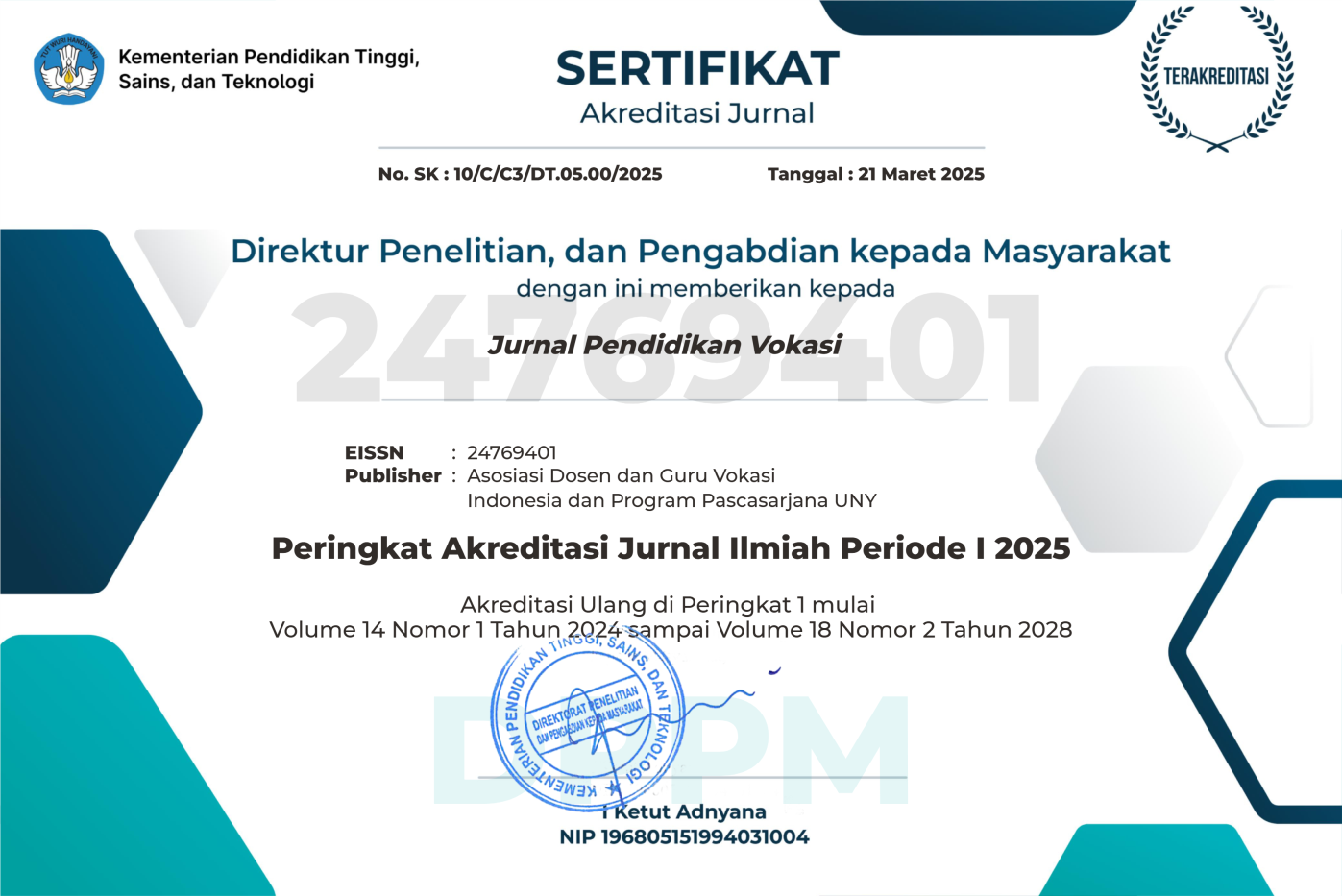Evaluation of student internship programs to support the sustainability of vocational education institutions and industrial cooperation programs
DOI:
https://doi.org/10.21831/jpv.v14i1.63585Keywords:
Evaluation program, internship, vocational educationAbstract
References
Alfeld, C., Charner, I., Johnson, L., & Watts, E. (2013). Work-based learning opportunities for high school students. National Research Center for Career and Technical Education. https://files.eric.ed.gov/fulltext/ED574519.pdf
Alya, R., & Ikhwan, A. (2022). Mobile-based design of information system for vocational internship activities for vocational students. Sinkron, 7(4), 2361–2368. https://doi.org/10.33395/sinkron.v7i4.11764
Anwar, C., Kholifah, N., Nurtanto, M., & Nur, H. R. (2023). The capability of vocational education students in industrial practice learning programs. Journal of Technology and Science Education, 13(3), 657–672. https://doi.org/10.3926/jotse.1960
Barabasch, A., Bohlinger, S., & Wolf, S. (2021). Reconstructing policy transfer in adult and vocational education and training. Research in Comparative and International Education, 16(4), 339–360. https://doi.org/10.1177/17454999211062825
Billett, S. (2022). Lifelong learning. In Oxford Research Encyclopedia of Education. Oxford University Press. https://doi.org/10.1093/acrefore/9780190264093.013.1787
Casey, C., & Wakeling, P. (2022). University or degree apprenticeship? Stratification and uncertainty in routes to the solicitors' profession. Work, Employment and Society, 36(1), 40–58. https://doi.org/10.1177/0950017020977001
David, F., David, F., & David, M. (2019). Strategic management: A competitive advantage approach, concepts and cases. Pearson.
Eraut, M. (2004). Informal learning in the workplace. Studies in Continuing Education, 26(2), 247–273. https://doi.org/10.1080/158037042000225245
Fulk, G. (2023). Descriptive statistics, an important first step. Journal of Neurologic Physical Therapy, 47(2), 63. https://doi.org/10.1097/NPT.0000000000000434
Haasler, S. R. (2020). The German system of vocational education and training: Challenges of gender, academisation and the integration of low-achieving youth. Transfer: European Review of Labour and Research, 26(1), 57–71. https://doi.org/10.1177/1024258919898115
Hardia, L., Goa, Y. La, Sari, E. M., Difinubun, M. I., & Irwandi, I. (2023). Evaluasi Implementasi Program Merdeka Belajar Kampus Merdeka (MBKM) pada Fakultas Sains dan Teknologi Universitas Pendidikan Muhammadiyah Sorong. Jurnal Pendidikan, 11(2), 326–337. https://doi.org/10.36232/pendidikan.v11i2.2852
Hasti, N., Lesari, S., & Gustiana, I. (2019). Web-based internship information system. IOP Conference Series: Materials Science and Engineering, 662(2), 022090. https://doi.org/10.1088/1757-899X/662/2/022090
Istiadi, I. (2022). Internship program in company: Cultural learning process for students. Journal of Indonesia Tourism and Policy Studies, 7(1), 2. https://doi.org/10.7454/jitps.v7i1.281
Iwacewicz-OrÅ‚owska, A. (2022). The role of international internships in the vocational education of technical secondary school students. Economic and Regional Studies / Studia Ekonomiczne i Regionalne, 15(4), 548–561. https://doi.org/10.2478/ers-2022-0037
Jain, P. K., Gupta, S., & Yadav, S. S. (2014). Public sector enterprises in India. Springer India. https://doi.org/10.1007/978-81-322-1762-6
Jalinus, N., Syahril, S., Haq, S., & Kassymova, G. K. (2023). Work-based learning for the engineering field in vocational education: Understanding concepts, principles and best practices. Journal of Engineering Researcher and Lecturer, 2(1), 9–17. https://doi.org/10.58712/jerel.v2i1.22
Kamdi, W., & Dewi, D. M. (2019). The effectiveness of industrial work practice in preparing the capabilities of students to enter the business, Industrial World (DUDI) and Industrial Revolution 4.0. Proceedings of the 2nd International Conference on Vocational Education and Training (ICOVET 2018), 95–99. https://doi.org/10.2991/icovet-18.2019.24
Komalasari, R. (2020). Manfaat teknologi informasi dan komunikasi di masa Pandemi Covid 19. TEMATIK, 7(1), 38–50. https://doi.org/10.38204/tematik.v7i1.369
Markova, S. M., Zinovieva, S. A., Sedykh, E. P., & Urakova, E. A. (2022). The role of vocational education in the implementation of integration mechanisms for the economy's development. In E. G. Popkova & B. S. Sergi (Eds.), Digital Education in Russia and Central Asia (pp. 161–169). Springer Nature Singapore. https://doi.org/10.1007/978-981-16-9069-3_17
Marsono, Muzani, M. R., Basuki, Sutadji, E., Yoto, Mustakim, S. S., Ali, P. H. M. S. bin P. H., & Khasanah, F. (2019). School and industries collaboration on implementing vocational education internship program: Best practice in Indonesia. Proceedings of the 1st Vocational Education International Conference (VEIC 2019), 293–299. https://doi.org/10.2991/assehr.k.191217.047
Nasution, D. P. (2023). Implementasi program magang Merdeka Belajar-Kampus Merdeka di DISPERINDAG Sumut untuk meningkatkan kompetensi mahasiswa memasuki dunia kerja. JURNAL PENGABDIAN MANDIRI, 2(7), 1541–1548. https://bajangjournal.com/index.php/JPM/article/view/6185
Osokoya, I., Null, N., Null, N., & Null, N. (2010). Teacher education in Nigeria: Past, present and future challenges. Academic Leadership: The Online Journal, 8(4), 61. https://doi.org/10.58809/HYLI2137
Rahmadhani, S., Ahyanuardi, & Suryati, L. (2022). Vocational high school students' competency needs to the world of work. Mimbar Ilmu, 27(2), 349–355. https://doi.org/10.23887/mi.v27i1.42161
Rahmawati, Y., Alhapip, L., Barliana, M. S., Ana, A., & Dwiyanti, V. (2021). Adaptive curriculum development on tourism vocational secondary education. Applied Science and Innovative Research, 5(1), 39–52. https://doi.org/10.22158/asir.v5n1p39
Silva, C., Ribeiro, P., Pinto, E. B., & Monteiro, P. (2021). Maturity model for collaborative R&D university-industry sustainable partnerships. Procedia Computer Science, 181, 811–817. https://doi.org/10.1016/j.procs.2021.01.234
Sofyan, H. (2018). Pendidikan teknologi kejuruan. UNY Press.
Sweitzer, H. F., & King, M. A. (2009). The successful internship: Personal, professional, and civic development. Brooks/Cole.
Yang, W., Junjie, W., & Weihua, L. (2023). Design of electrical vocational education instructional based on problem orientation. International Journal of Vocational Education and Training Research, 9(1), 1–5. https://doi.org/10.11648/j.ijvetr.20230901.11
Yusuf, F. F. A., & Basrowi, B. (2023). The effectiveness of the internship program for vocational highschool students using the CIPP method. JTP - Jurnal Teknologi Pendidikan, 25(1), 15–28. https://doi.org/10.21009/jtp.v25i1.33553
Zhao, Y., & Ko, J. (2022). Enhancements of vocational students' engagement of workplace learning in the industry-university collaboration learning environment: A case study in the greater bay area. In Applied Degree Education and the Future of Learning (pp. 381–393). Springer Nature Singapore. https://doi.org/10.1007/978-981-16-9812-5_21
Zhiyong, D. (2023). CIPP Model Applied Research in Online Evaluation of Online Teaching of Internet Marketing. Curriculum and Teaching Methodology, 6(11), 81–85. https://doi.org/10.23977/curtm.2023.061115
Downloads
Published
How to Cite
Issue
Section
Citation Check
License
The authors submitting a manuscript to this journal agree that, if accepted for publication, copyright publishing of the submission shall be assigned to Jurnal Pendidikan Vokasi. However, even though the journal asks for a copyright transfer, the authors retain (or are granted back) significant scholarly rights.
The copyright transfer agreement form can be downloaded here: [JPV Copyright Transfer Agreement Form]
The copyright form should be signed originally and sent to the Editorial Office through email to jpvokasi@uny.ac.id
Jurnal Pendidikan Vokasi by http://journal.uny.ac.id/index.php/jpv is licensed under a Creative Commons Attribution-ShareAlike 4.0 International License.













